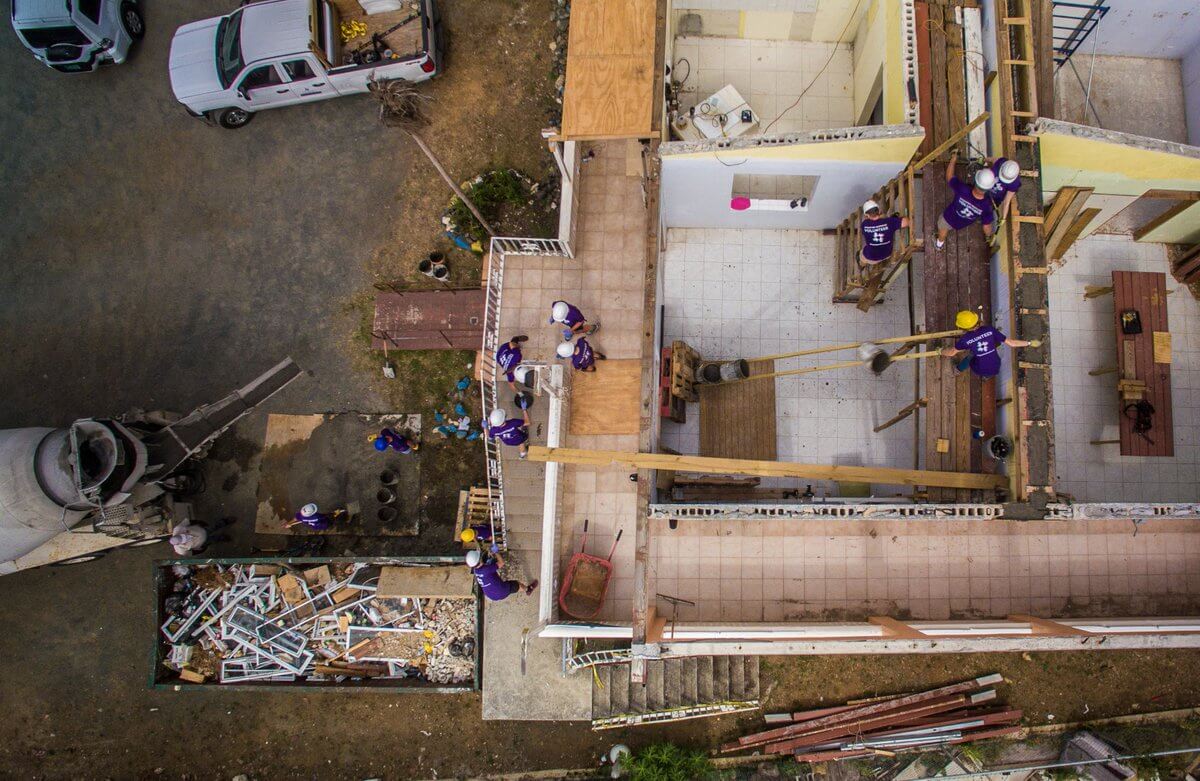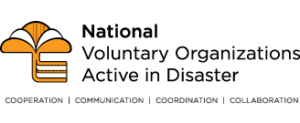We welcome the republication of our content. Please credit the Center for Disaster Philanthropy.

National Voluntary Organizations Active in Disasters
Overview
The phrase ‘Voluntary Organizations Active in Disasters’ or VOAD refers to the network that is formed by many nonprofit organizations coming together at the local, state/territorial or national level. Often, these individual organizations that respond in a time of crisis are also called ‘VOADs’ (or, despite the redundancy, ‘VOAD organizations.’)
National Voluntary Organizations Active in Disasters (National VOAD or NVOAD) is “an association of organizations that mitigate and alleviate the impact of disasters, provides a forum promoting cooperation, communication, coordination and collaboration; and fosters more effective delivery of services to communities affected by disaster” (from Our Mission).
NVOAD understands that effective service delivery during a disaster begins with collaboration and relationship building during “blue skies.”

National VOAD membership is divided into national members, state/territory members and partners. They describe their membership as: “Our membership is as diverse as our capabilities, and our members pride themselves on working together to bring relief to survivors.”
- National members: The organization has more than 75 national member nonprofit organizations that respond to disasters across the entire country.
- State/territory: Each state/territory has a State VOAD structure, which also belongs to National VOAD; there are approximately 56 state members. These members provide coordination during a local or regional disaster, often having a seat at the state or local Emergency Operations Center.
- Partners: The partner membership categories include: foundations, nonprofits, government agencies, for-profit corporations, education and research institutions, and associations. (The Center for Disaster Philanthropy (CDP) is a nonprofit partner.) Partners work with VOAD members to improve U.S. disaster relief, response and recovery efforts in various ways, including sponsorship, providing member benefits and subject matter expertise. For example, members can access “reduced shipping, lodging and transportation rates thanks to [their] partnerships with UPS, Airbnb, and Enterprise.”
Additionally, in many states and territories, there are local VOADs and Community Organizations Active in Disasters. During a disaster, this group may coordinate responding organizations and services to ensure that “unmet needs are addressed, provide financial assistance and supplies, and share knowledge and resources with local residents during a disaster.” Without local VOAD, this coordination may be done at the state or territory VOAD level. National responding organizations will coordinate with local community organizations to provide services.
Key Facts
- NVOAD was founded in 1970 following Hurricane Camille in August 1969. It was recognized that the previous system of non-coordinated response from government, nonprofits and the private sector often resulted in duplication of services, unmet needs and gaps and unnecessary competition. Access to training for volunteers and information on assistance and services for disaster survivors was limited. Seven national disaster response organizations met in 1970 to create National VOAD “as a forum for sharing knowledge and coordinating resources – money, materials and manpower – throughout the disaster cycle: preparation, response and recovery.”
- All VOAD members share common values and principles to guide their work. Known as the 4Cs, they are Communication, Coordination, Collaboration and Cooperation.
- During disasters, NVOAD is not a place to donate funds. Instead, grants and donations should be given to the nonprofit organizations directly (or, if appropriate, to a state, territorial or local VOAD).
- In 2023, the board of NVOAD adopted a Diversity, Equity and Inclusion (DEI) statement that says that NVOAD “recognizes, celebrates, and embraces diversity. National VOAD is committed to providing appropriate services without discrimination respecting all individuals, including those from different backgrounds and communities.” They list several identity groups, including culture, ethnicity, religion, age, gender identity, sexual orientation, citizenship status, functional capability, disability, or other differences.
- In 2023, National VOAD was accepted to participate in Walmart’s Advancing Racial Equity Community of Practice, along with several other organizations, including American Red Cross, Center for the Future of Arizona, World Wildlife Foundation, Team Rubicon and Winrock International.
- The 2021 National VOAD Triennial Review found that in 2019, “National VOAD members utilized 9,907,071 volunteers who contributed 48,129,263 volunteer hours. That equates to over $1.3 billion in donated labor to response and recovery efforts across the United States in 2019 alone (volunteer hour valued at $28.54 according to Independent Sector).” A triennial review is underway, as of August 2023, to capture the impact of the voluntary sector in the years post-COVID.
- Four national members have been active in responding to disasters for more than 130 years, and two others for 100 years or longer. Four members have been active for five years. Since 2000, there has been a 158% increase in membership, representing 45 new groups. This reflects the response in the sector from new groups which formed after 9/11 and Hurricane Katrina.
- National VOAD and the Center for Disaster Philanthropy have had a formal partnership agreement since 2013. The partnership is designed to coordinate nonprofit partnerships with private philanthropy. National VOAD shares the work of its members with CDP, which in turn shares the information with its community of donors. NVOAD has a representative on CDP’s Advisory Council, and CDP staff sit on some NVOAD committees.
- National VOAD has had its own grantmaking program since 2013. This supports the activities of National VOAD member organizations during response and recovery efforts. For example, for several years, Lowe’s has funded the “Lowe’s Reconstruction Grant” program, which provides reconstruction material supplies.
How You Can Help
- Provide ongoing operational and administrative support. The VOAD member organizations raise most of their funds during a disaster. Their service provision may be limited depending on how much money is raised to support their work. Administrative or ongoing operational funding allows them to concentrate their efforts on service provision.
- Create advance MOU agreements. In cases where a funder only wants to fund when a disaster strikes, an advance MOU can be created that is operationalized when a disaster strikes, providing a surety of funds.
- Provide technical assistance. You have skills that could be useful for a VOAD organization or the VOAD itself. During a disaster, reach out to your state VOAD and offer your personal assistance or that of your company. A logistics manager could provide support with setting up distribution routes. Administrative staff could assist with data entry needs.
- Provide backbone organizational support. The role of coordinating the local or state VOAD networks is often an add-on position, on top of regular duties, to a staff member working for a disaster organization. Providing backbone support, including overhead and administrative funding, before a disaster allows the network to grow and strengthen before the crisis hits.
- Support National VOAD’s ongoing costs. National VOAD, while it does utilize paid staff, also operates on a very lean budget. Support for overhead, administration and operational funding can allow NVOAD to focus its efforts on ensuring effective coordination and collaboration. In addition, funding can be used to train VOAD members and support preparedness and planning efforts.
What Funders Are Doing
- In July 2023, the Center for Disaster Philanthropy, through our Atlantic Hurricane Season Fund, provided a $200,000 grant to New Jersey Voluntary Organizations Active in Disaster, Inc. to help them coordinate meeting the unmet needs of survivors of the remnants of Hurricane Ida. This work included organizing, establishing and training community/county/regional long-term recovery organizations to serve survivors’ unmet needs throughout the disaster region with a focus on vulnerable populations.
- In 2019, the Prudential Foundation gave a $75,000 grant to the New Jersey VOAD to support its programs and conference.
- In 2019, the Margaret A. Cargill Foundation provided a $125,000 grant to National VOAD to evaluate the current status of State/Territory VOADs and provide appropriate training to enhance its capabilities and capacity to deliver services for disaster survivors in collaboration with the government and private sectors. In 2023, this program was funded for an additional phase to continue strengthening the networks and relationships created during the first iteration.